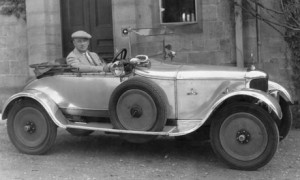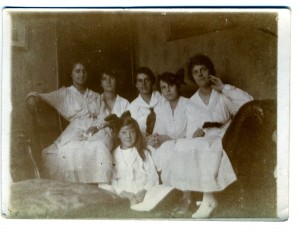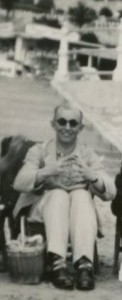
The first time it happened was at my great-grandfather’s terraced house in Black Tom in the years immediately prior to the Great War. There’d been a death in the family, and then a funeral. My grandmother and her five sisters shared a bedroom, and sat up late into the night, or must have done, or at any rate were only sleeping lightly, when they were disturbed by violent hammering on the front door.

Someone – Doll, Con, Mill, but not Babs whose story this was, or Gwen who was too young – went to answer. Whoever was working the door knocker intensified their battery as she approached – but stopped dead as she pulled the door open, revealing an empty doorstep and, as she leaned out, a deserted street.
It was a pattern that was to become familiar to the family over the next twenty years. A death in the family, a funeral, and then on the night after the funeral, a midnight visitor to wake them all. But each time, the door opened onto abrupt absence and silence.
My mother was one of the only children – perhaps the only child – to come from the six girls who started out in that four-roomed terrace in Black Tom. As the 1970s got underway, the family began to dwindle. Gran’s house, across the road from the one she’d been born in, slowly filled with the left-overs of ended lives.
Some of these items found their way into the quiet of the front room, the parlour, the “Sunday Best” room with its velvet couch on which I’d be left to sit out earache and bouts of bronchitis and asthma. In particular, I remember a small bookcase. I didn’t know who it had belonged to. On it were a set of books bound in blue, and another bound in maroon. I couldn’t yet read, and remember nothing of their quality. But they impressed me.
Almost twenty years later, I’d been driven off Broad Street into the Oxford branch of Dillons by rain, and by bloody crowded pavements of idiots, and by a sort of fury and despair. It was one of those black wet Michaelmas evenings, and I stormed around the tables looking for something to spend money on in protest. It didn’t take long: a selected Sherlock Holmes, and Vintage Wodehouse, Richard Usbourne’s Penguin collection of Plum’s best short stories, the edition with the Ionicus cover. That evening, I met Jeeves for the first time.
It’s the shared bewilderment of everyone who didn’t come across P.G.Wodehouse until their twenties or later. Why didn’t anyone tell us? Once you have embarked on Wodehouse, of course, you can’t leave your front door without tripping over a tribute to the man. But prior to that, omerta.
This was brought home to me a little later when I finally got around to asking my mother what the books in Gran’s front room had been, and what had become of them. I was expecting a dictionary or cheap door to door encyclopedia. Instead, she replied, “Those were my father’s P.G. Wodehouse books.”
My grandfather’s P.G. Wodehouse books? My grandfather read P.G. Wodehouse? My grandfather who died in 1952? The family hadn’t had many books, I’d thought, let alone those.
But so it was, and not only that. When reading Plum to himself, my grandfather – and this is so typical of real Wodehouse fans – had had the habit of chuckling out loud at a passage, and then refusing to explain the joke. This, it seems, had driven Gran and my young mother to distraction. It also revealed them as non-Wodehousians.
I might have guessed this of my grandfather, though. I mean, look at him:

It’s the smile, it’s the socks, it’s the hands, it’s the shades. In amongst the hundreds of terrible snapshots that my family began to spew out after 1918, my grandfather stands out. He looks like a twentieth century man, and one in perpetual good humour. Carpe diem, perhaps: he was a diabetic before there was much to be done about it, and there must have been a shadow. At any rate, it’s clear that the little girl who is in almost all of these shots – my mother – was the apple of his eye. His death from an early heart attack must have broken her heart.
Because, she told me, his Wodehouses weren’t boxed in the attic, or kept in some cupboard for me to pore over and silently compare collections with him. She’d disposed of them after Gran’s death, the memories too much to bear.
And there was one other thing.
The door to my mother’s living room in 1952 had had one of those big Briton closers on it to keep the cold out. After my grandfather’s funeral, Gran and my mother sat together there into the evening. Too much to do and nothing to do.
At some point as the night drew in, my mother’s little dog began to display signs of agitation. Hackles up, she began to snarl in the direction of the door, then, in swelling panic, started to bark. As she did so, the door pushed itself open against the spring, held there for a moment, then gently closed. Now the dog swung over to my grandfather’s empty armchair, half gulping, half barking, beside herself, arching up and backing away from it. For a minute or so, a long minute, she yelped her panic and fear into the grieving room, and then, as abruptly as she had started, calmed and settled down.
To date, there have been no more instances of this kind. That was the last.
One wonders what Wodehouse would have made of it all. There are ghost stories in the Plum canon, sure enough. But they possess the same qualities of compassion and gentleness as his pastoral comedies, the same implicit awareness of (unspoken) seriousness, so different from the light! detached! whimsical! sideways views that lesser writers have always resorted to. Here’s a haunted poem of Plum’s, in memory of my grandfather and the Wodehouses that helped cheer a cheerful man’s life before it was so harshly curtailed.
The Haunted Tram by P.G. Wodehouse
Ghosts of The Towers, The Grange, The Court,
Ghosts of the Castle Keep.
Ghosts of the finicking, “high-life” sort
Are growing a trifle cheap.
But here is a spook of another stamp,
No thin, theatrical sham,
But a spectre who fears not dirt nor damp:
He rides on a London tram.
By the curious glance of a mortal eye
He is not seen. He’s heard.
His steps go a-creeping, creeping by,
He speaks but a single word.
You may hear his feet: you may hear them plain,
For—it’s odd in a ghost—they crunch.
You may hear the whirr of his rattling chain,
And the ting of his ringing punch.
The gathering shadows of night fall fast;
The lamps in the street are lit;
To the roof have the eerie footsteps passed,
Where the outside passengers sit.
To the passenger’s side has the spectre paced;
For a moment he halts, they say,
Then a ring from the punch at the unseen waist,
And the footsteps pass away.
That is the tale of the haunted car;
And if on that car you ride
You won’t, believe me, have journeyed far
Ere the spectre seeks your side.
Ay, all unseen by your seat he’ll stand,
And (unless it’s a wig) your hair
Will rise at the touch of his icy hand,
And the sound of his whispered “Fare!”
At the end of the trip, when you’re getting down
(And you’ll probably simply fly!)
Just give the conductor half-a-crown,
Ask who is the ghost and why.
And the man will explain with bated breath
(And point you a moral) thus:
“‘E’s a pore young bloke wot wos crushed to death
By people as fought
As they didn’t ought
For seats on a crowded bus.”
http://www.youtube.com/watch?v=h7nbIRvcXJk
Lovely. Thank you – into the music folder with that one.